Phase Equilibria in the Ni-Si-B System
Tatsuya Tokunaga, Kazumasa Nishio, Hiroshi Ohtani, Mitsuhiro Hasebe
pp. 1651-1654
Abstract
A thermodynamic study has been carried out on the Ni–Si–B ternary system, which is an important system in view of the development of Ni-base filler metals. A regular solution approximation based on the sublattice model was adopted to describe the Gibbs energy for the individual phases in the binary and ternary systems. Thermodynamic parameters for each phase have been evaluated using the available experimental information on phase boundaries and other related thermodynamic properties. Thermal analysis experiments have also been conducted on several ternary alloys to re-examine the available ternary experimental data on phase boundaries. The set of evaluated parameters in this study enables reproducible calculations of the liquidus and solidus temperatures and vertical section diagrams satisfactorily.










